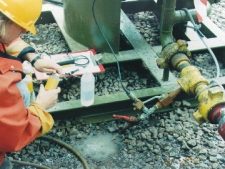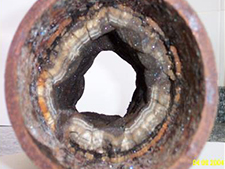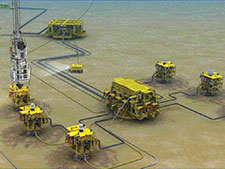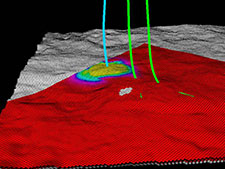Ross McCartney has just presented a paper entitled “Everest Well ET-14z: The Complexity of Produced Water Production Revealed” at the SPE Scale Symposium in Aberdeen. The paper was co-authored with Peter Wood and Kevin Angus of Harbour Energy plc. This paper shows how a modified well test was undertaken to help understand the multiple reservoir and downhole factors causing the produced water compositions from ET-14z to be very variable. Once these factors were understood, it was possible to reliably determine the scale and formation damage risks to the well (see the abstract here).
News
Recently completed projects
Over the last two years we have completed a range of projects for our Clients including:
- Studies to evaluate formation water compositions across different areas of the North Sea and Norwegian North Sea. In each case the objectives were to understand the variation of formation water compositions across the areas and use this information to identify the likely source of water being produced from particular production wells.
- Predictions of scaling risks associated with production from gas, gas condensate and oil reservoirs.
- Prediction of the likely organic acid content of formation water in a reservoir and, based on this, prediction of the organic acid content of condensation water produced with gas condensate from the reservoir.
- Prediction of scaling risks associated with produced water injection into a reservoir.
- Evaluation of SO4-rich formation water analyses from a reservoir, and associated regional formation water analyses, to determine whether the SO4-rich analyses are likely to be representative of reservoir formation water.
- Evaluation of formation water analyses from several fields from one area of the Norwegian North Sea to determine whether they were representative of reservoir formation water. Where this was not the case, their compositions were corrected for the effects of mud aqueous phase contamination, loss of CO2 from the samples, exposure of the samples to air, and erroneous sample SO4 analyses.
- Development of novel methods to track spent acid returns following well stimulation.
- Estimation of formation water compositions for wells producing mixtures of formation water and condensation water, and use of these compositions to predict scaling risks in the wells.
- Prediction of reactions occurring in a reservoir and associated cap rock during and after CO2 injection associated with a carbon storage project.
If you have similar challenges on your projects, please do not hesitate to contact us!
Workshop delivered to WintershallDea
Ross McCartney recently delivered a customised workshop for WintershallDea entitled ‘Are your formation water compositions reliable?’. The workshop was presented on-line over five, weekly, ~2.5 hour sessions to a variety of petrophysicists, production chemists, production engineers and geologists from Norway, Germany, Russia, Mexico, Argentina, and the Middle East. The convenient format enabled staff to attend all or parts of the workshop as they required, regardless of time zone.
The first four sessions of the workshop covered:
- The factors controlling formation water compositions in sedimentary basins.
- Lower salinity formation waters – why they are important, their origins and occurrence, and their compositions.
- Variation of formation water compositions in an individual field – why they occur, the risk that they will occur, and how they can be identified.
- How to acquire good quality formation water compositions from well tests, formation tests, and core samples.
- Factors and processes that can cause your formation water sample composition to be different from that in the reservoir, and how to identify when this is likely to be the case.
- How to estimate the formation water composition when your formation water samples/analyses are compromised, how to validate the estimate, and the importance of recognising remaining uncertainties.
The topics were illustrated with many field examples, including several from WintershallDea fields. In the final session, WintershallDea staff had the opportunity to present some relevant current field examples and describe the challenges associated with them. This was a good opportunity for these to be discussed amongst the staff to consolidate their learning from the workshop, and to gain expert input and guidance on these cases from Ross McCartney.
The post-workshop survey showed the overall experience of the participants was very good (4.43 out of 5) and all participants said they would recommend the course to a fellow colleague. Andreas Kansy (WintershallDea Chief Petrophysicst) said:
“We asked Ross to put on this workshop because of his expertise, experience, and knowledge in this area, and because we knew it would provide an important learning opportunity for our technical staff, regardless of experience. The format worked well and meant that attendance was high despite work commitments. The use of field case studies (many from our own fields) to consolidate the information provided in the presentations, was particularly beneficial. The workshop met all our expectations, was well presented, and covered many aspects of formation waters that are not normally included in other oilfield educational resources”.
If this type of workshop would be of interest to you and your company, please message ross@oilfieldwaterservices.co.uk and he will be happy to discuss with you how the course can be tailored to suit your requirements.
Paper presented at the 32nd Tekna Oil Field Chemistry Symposium 2021
Ross McCartney recently presented a paper titled “De-risking dissolver treatments in low pressure wells by data manipulation and modelling“. This paper shows how formation water compositions and rates can be estimated from produced water compositions and rates when condensation water is being produced. In this case, it allowed the genuine scale risks in the wells to be determined to aid the development of appropriate scale mitigation and treatment plans.
Paper presented at the 2020 SPE Oilfield Scale Conference
Looking for advice on how to collect and handle formation water samples? Ross McCartney recently presented a paper titled “Simulation of Sampling Conditions to Aid Optimum Collection and Handling of Formation Water Samples During Formation Testing” which will be of interest to you.
Paper accepted for Oilfield Scale Conference, Aberdeen, June 2018
A case study paper co-authored by Ross McCartney has been accepted for presentation at the SPE International Oilfield Scale Conference and Exhibition in Aberdeen in June 2018.
It is entitled “Correcting for Mud Filtrate Contamination of Formation Water Samples for Scale Management Planning: A Case Study from the Nova Field, Norwegian North Sea” and is co-authored with Stephan Hatscher and Vincent Droppert (Wintershall Norge AS) (view abstract here).
Links to the papers will be posted after they have been presented.
Provision of formation water quality assessments to Core Specialist Services Limited
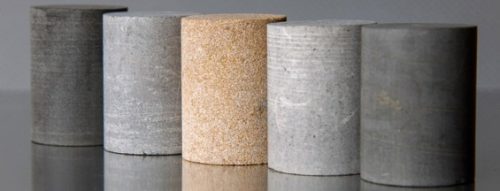
Formation water compositions are usually required for core studies undertaken on SCAL, formation damage and EOR projects.
But, formation water compositions may not be representative of those in the reservoir because they can be changed by many factors including: contamination (e.g. by drilling mud, use of incorrect preservatives, etc), sample cooling, sample de-pressurisation, sample de-gassing, exposure of the sample to air, use of inaccurate or inappropriate analytical methods, and erroneous reporting.
Use of an incorrect formation water composition can impact core study results, including:
- Clay swelling and fines mobilisation (induced damage studies).
- Use of incorrect salinity (resistivity/conductivity for Petrophysical SCAL studies).
- Incorrect viscosity (mobility ratio for reservoir engineering SCAL studies).
- Formation of mineral scale.
- EOR with polymer and surfactants need to be accurately matched to a correct formation water salinity.
- EOR by low salinity water flooding; de-risking the formation water composition is of profound importance.
Recently, we have been pleased to support Core Specialist Services Limited (CSS) by evaluating the quality of formation water compositions before they are used in core studies.
This work has involved (a) identification of uncertainties in these compositions arising from sampling and analysis conditions, (b) constraining/estimating more appropriate compositions where necessary, and (c) providing compositions that will be stable for laboratory studies.
The evaluations have been well received by CSS Clients and CSS are now offering this as a routine service option. Please see the CSS website for more details.
New paper published in SPE Production and Operations….
The paper entitled “Johan Sverdrup Field – Origin of sulphate-rich formation water and impact on scale management strategy” (co-authored with Kari Ramstad, Henriette Dorthea Aarrestad, Siv Kari Lien, Øystein Sæther, and Rita Iren Johnsen of Statoil ASA) has now been published in SPE Production and Operations (preprint). View here….
Links for newly presented papers now available….
Links for papers co-authored by Ross McCartney that were presented at the SPE International Oilfield Scale Conference and Exhibition in Aberdeen on 11-12 May 2016 are now available:
- High Pb and Zn Concentrations in Formation Water From the Culzean Field: Real or Artefact?” (co-authored with Stuart Brice and Andrew Chalmers of Maersk Oil North Sea UK Ltd). View here….
- Johan Sverdrup Field – Origin of sulphate-rich formation water and impact on scale management strategy (co-authored with Kari Ramstad, Henriette Dorthea Aarrestad, Siv Kari Lien, Øystein Sæther, and Rita Iren Johnsen of Statoil ASA). View here….
Papers accepted for Oilfield Scale Conference, Aberdeen, May 2016
Two case study papers co-authored by Ross McCartney have been accepted for presentation at the SPE International Oilfield Scale Conference and Exhibition in Aberdeen next May.
The first is entitled “High Pb and Zn Concentrations in Formation Water From the Culzean Field: Real or Artefact?” and is co-authored with Stuart Brice and Andrew Chalmers of Maersk Oil North Sea UK Ltd (view abstract here).
The second is co-authored with Kari Ramstad, Henriette Dorthea Aarrestad, Siv Kari Lien, Øystein Sæther, and Rita Iren Johnsen of Statoil ASA and is entitled “Johan Sverdrup Field – Origin of sulphate-rich formation water and impact on scale management strategy” (view abstract here).
Links to the papers will be posted after they have been presented.

